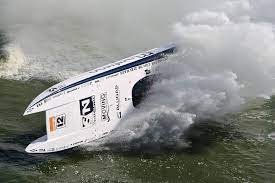Powerboat racing is fun, but that’s because it’s challenging. Beginners may struggle to remember all the rules of powerboat racing, including the different penalties that can be imposed for breaking them. This article will discuss some of the most common powerboat racing violations and the penalties that come with them.
1. Unsportsmanlike Conduct
Unsportsmanlike conduct in powerboat racing refers to any actions taken by a competitor that violate the values of fair play, good sportsmanship, and respectful conduct toward other racers, officials, and spectators. It includes verbally or physically attacking others and disrespecting race officials.
Penalties for unsportsmanlike conduct include up to a $1,000 fine and disqualification from the event. It could also be grounds for a 1-year suspension from APBA Offshore events and membership.
2. Reckless Driving
Reckless driving that endangers any craft, boat, person, or property is strictly prohibited. Any participant found engaging in behavior like that will be disqualified immediately.
3. Not Wearing Approved Helmets and Jackets
During races or test sessions all drivers and riding crew members need to wear approved life jackets and crash helmets. Failure to follow this safety rule will result in disqualification from the event. This regulation ensures the protection of individuals involved in high-speed, potentially dangerous activities.
4. Alcohol and Recreational Drugs
Drugs and boats don’t mix. Alcohol and mind-altering drug consumption by contestants and officials during races is prohibited. Among the barred drugs are narcotics, depressants, stimulants, and hallucinogenic drugs. This ensures the safety and fairness of the competition by discouraging impaired decision-making and performance due to intoxication or substance abuse.
Contestants and officials are expected to remain sober from the time they arrive at the race site on race day, until they have been cleared by post-race inspections, as well as for an additional hour after the race ends. If a participant or official is found to be intoxicated by one of the substances on the prohibited list, the referee will impose a suspension for at least six months, if not more.
5. Jumping The Start
One of the most common violations in powerboat racing is jumping the start. This refers to a boat crosses the starting line before the official signal to begin. To maintain fairness, boats that jump the start typically receive a time penalty, which can make all the difference in a tight race.
6. Speed Violations
Another necessary and crucial rule of powerboat racing is the need to maintain legal speed limits throughout the course. These speed limits to facilitate fair competition, but also to ensure participants’ safety and protect marine life or structures near the course. Boats that exceed these limits may be received time penalties or even be disqualified from the race.
7. Failure To Follow Course Markers
In powerboat racing, courses are marked with buoys or other floating devices to guide racers along their path. Straying off-course or cutting corners by ignoring these markers can lead to penalties. Participants risk disqualification if they repeatedly fail to follow designated paths.
8. Ignoring Safety Protocols
Everyone’s safety is a top priority in powerboat racing. Racers and their teams are expected to follow established safety protocols during a race. This includes wearing appropriate safety gear and maintaining a safe distance from other boats during warm-up laps or cool-down periods. Failure to adhere to these protocols can lead to penalties, including fines and possible disqualification.
9. Environmental Violations
Powerboat racing can affect the surrounding ecosystem if not properly managed. Boats must adhere to environmental regulations such as containing oil leaks or avoiding sensitive aquatic areas. Failure to fulfill these responsibilities could lead to time penalties and even disqualifications from a race or series of races.
10. Equipment Violations
Powerboat racing regulations often include specifications for boat size, engine power, and other technical aspects. Boats that do not meet these criteria can be disqualified or penalized accordingly. In some cases, modifications to the boat may need to be made before the racer can participate in future events.
11. Non-Compliance with Race Officials
Disregarding the directions of race officials or failing to comply with their instructions can lead to penalties or disqualification. This includes ignoring safety signals during a race or not abiding by decisions made by officials regarding boat positioning or racing rules.
12. Failure to Adhere to Crew and Passenger Restrictions
Depending on the racing class and event regulations, there may be restrictions on crew and passenger numbers aboard competing boats. Violating these limits can result in penalties and even disqualification if discovered during the race.
Remember They Are Rules for a Reason
Powerboat racing requires racers to balance high-speed maneuvers with careful adherence to rules and regulations. Being aware of common violations and their associated penalties is vital for anyone looking to participate in this high-octane water sport.
It contributes to fair competition. It also ensures that everyone involved can enjoy the excitement of powerboat racing while maintaining a safe environment for racers and spectators alike.

